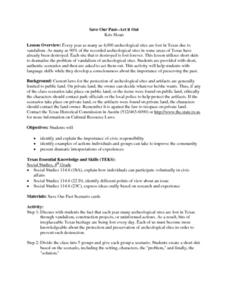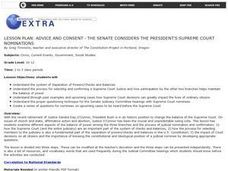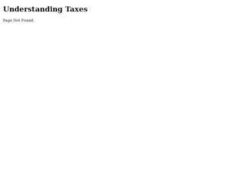Curated OER
Save Our Past -- Act It Out
Fourth graders identify and examine the importance of civic responsibility and the result of losing many archeological sites in Texas. In groups, they are given scenerio cards and act out each scene for the class. They also write a...
Curated OER
Martin Luther King, Jr.
Fifth graders discuss the importance of Martin Luther King, Jr. and reflect on civic responsibilities. They brainstorm ways in which they can help to fulfill Martin Luther King, Jr.'s dream of equality among all people. Students write...
Curated OER
The Missouri Headwaters: A Confluence of Cultures
Fourth graders research and analyze how people create and change structures of power, authority and government diversity. They review their civic responsibilities. In addition, they identity the major responsibilities of local, state,...
Curated OER
Mechanics Hall
Students complete a variety of activities that go along with the study of and possible fieldtrip to Mechanics Hall (Black River Valley) in Worcester, MA. They examine the role industrial development had in society at the turn of the...
Curated OER
Campaign 2004: Classroom Electorate
Students role play as political analysts first forecasting the electoral college vote in a presidential election and then, following the results of the actual count. They study the role of swing states, and why political participation is...
Curated OER
Little Kinnakeet Lifesaving/Coast Guard Station
Young scholars complete a variety of activities that go along with the study of and possible field trip to the Little Kinnakeet Lifesaving/Coast Guard Station on the Cape Hatteras National Seashore, NC.
Curated OER
There Was Always Sun
Young scholars investigate the chronicles of history about the Negro Leagues baseball by using rare historical footage and interviews with Black baseball greats. Students also examine how to work in groups to use online resources to...
Curated OER
Advice And Consent - the Senate Considers the President's Supreme Court Nominations
Students study the process and questioning for selecting a Supreme Court Justice. They examine how the decisions of the Supreme Court effect the lives of citizens. They complete worksheets as they study the material.
Curated OER
First Amendment or Treason?
Students investigate the meaning of the First Amendments right of freedom of speech. They examine the anti-war movement that occurred during the 1960's in response to the war in Vietnam. While studying primary sources, they determine how...
Curated OER
Social Studies: Grab Day at the Pueblo
Students develop a cultural understanding of "Grab Day." Using magazines, they clip out pictures to make collages of items thrown down to people on this day. Students label the items in their collages.
Curated OER
Podcasting and the News
Young scholars participate in a class discussion about pod casting. They access a podcast and practice using such features as pause, rewind, and fast-forward. They listen to a news podcast and complete a graphic organizer about what they...
Curated OER
Crazy Laws: There Must Have Been a Good Reason?
Students study the reasons for the passage of some "crazy" laws and illustrate one of them. They examine how current laws may seem outdated in 50 years.
Curated OER
Veterans Day
For this Veterans Day worksheet, learners fill in a crossword puzzle as they figure out the answers to fourteen facts about Veterans Day.
Curated OER
Lesson 1: Map Data and the Census
Students learn about the history of the census. In this U. S. Census lesson plan, students develop an understanding about how the United States Constitution grants and distributes power and discover how the spatial organization of...
PBS
America's Infrastructure: Miller Center National Discussion Debate Series
Junior high and high school learners study infrastructure and its relationship to the current economy. They review handouts, watch a PBS clip, and review case studies in order to answer provided questions and role play over their views...
Curated OER
The Wealth Tax of 1935 and the Victory Tax of 1942
Students explain that during the Great Depression and World War II, the Roosevelt administration implemented new, broader, and more progressive taxes in order to cover the costs of the New Deal programs and the war.

















